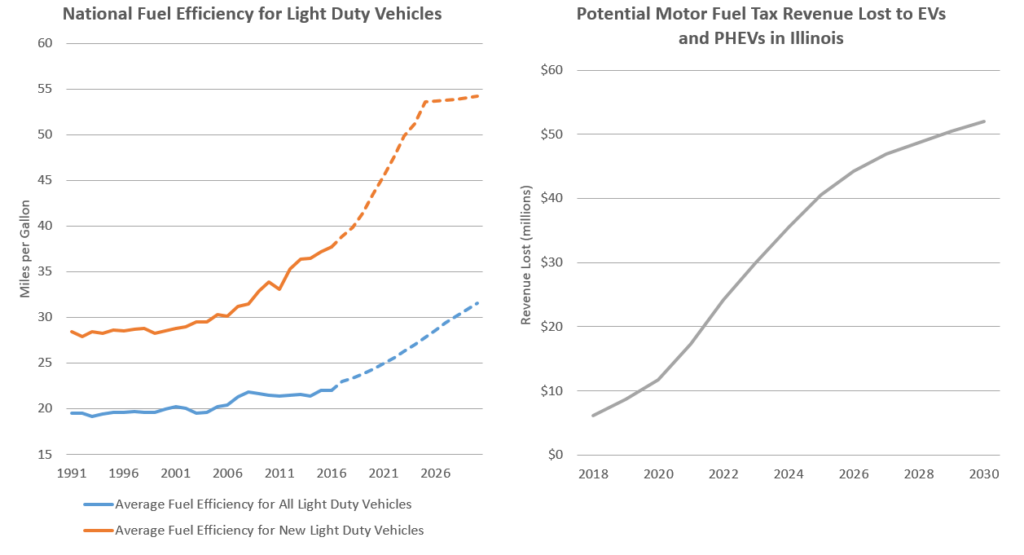The Unintended Consequence of Going Green
The technology that moves us has changed, but the way we fund our transportation infrastructure hasn’t. The result is a shortfall in funding that will only continue to grow. On February 22, NPR’s David Schaper moderated an MPC panel with experts to talk about an alternative funding source: mileage-based user fees.

Like most states, Illinois relies heavily on the motor fuel tax (MFT) to fund transportation infrastructure projects. In many ways, the MFT has been the perfect tax. People are more or less charged proportionately to their road usage—the more you drive the more gallons of gas you buy and the more tax you pay. Administrative costs are very low and—most importantly—most of us don’t even realize we’re paying it. And while it’s true that the MFT¹ raises an important share of Illinois’ transportation funding, the motor fuel tax’s productivity won’t last forever. Fuel efficiency for new vehicles continuously improves, and electric vehicle sales are skyrocketing as batteries improve and costs come down. All this means that people will be buying a lot less gas in the future. While that’s a great for the planet, the subsequent decrease in fuel tax revenue isn’t so great for Illinois’ transportation funding. At some point—and it might be sooner than you think—we must transition to another source of revenue to keep our roads and bridges from crumbling.
While fuel efficient vehicles are great for the planet, the subsequent decrease in fuel tax revenue isn’t so great for Illinois’ transportation funding.

On February 22, MPC held a sold-out roundtable event to discuss one possible solution: mileage-based user fees (MBUFs), also known as road usage charges (RUCs) or vehicle miles traveled (VMT) fees. Two guest panelists shared their direct experience with this mechanism. Maureen Bock from the Oregon Department of Transportation (ODOT) manages the state’s OReGO program, the country’s first fully implemented mileage-based user fee program. Nate Bryer is the Vice President of Innovation at Azuga, a vehicle tracking company that manufactures the software and hardware that make MBUF programs possible. MPC’s own Director of Transportation Audrey Wennink provided a local perspective, and national NPR correspondent David Schaper moderated.
Maureen explained the history of the OReGO program and how ODOT has addressed the issues and concerns of drivers. Back in 2001, the Oregon legislature created a task force to find a long-term sustainable user fee for the state’s road system. The state conducted its first opt-in pilot in 2006 and an additional pilot in 2012 before establishing the present program in 2015. Their OReGO Program Final Report summarizes their pilot history and lessons learned. One key lesson? Drivers in Oregon had many of the same concerns we would likely face here, with privacy being the most common. To mitigate privacy concerns, the OReGO program is structured so that ODOT receives only aggregated data on distance traveled, with no locational information whatsoever. Once the account is settled, the data is destroyed within 30 days. Law enforcement is required to have a warrant to access the data, but destroyed data is not recoverable.
Geographical equity was another major hurdle. There’s a perception that rural drivers are more impacted by a MBUF because the distances between their destinations are greater. The research in Oregon, and elsewhere, actually shows that rural and urban drivers travel about the same distances. Urban drivers take shorter but more frequent trips, while rural drivers take longer and fewer trips. In all cases, ODOT found that with more public information and more experience, the rate of acceptance among participants dramatically increased.

ODOT found that more information and participation in the pilot program both significantly increased acceptance of mileage-based user fees.
Nate discussed Azuga’s involvement in the OReGO program and several other mileage-based user fee pilots around the country, including California, Washington, Colorado and the I-95 corridor on the East Coast. He explained how the technology works reliably. A system can be configured to satisfy any requirements set by policymakers in a given state. Mileage reporting also doesn’t have to mean GPS tracking. There are a range of options available for participants in pilot programs, including low-tech options like photographing your vehicle’s odometer. The bottom line? Pilots show that statewide and interstate MBUF programs are possible. And when drivers understand the shortcomings of the current transportation funding structure, they’ve found MBUFs to be an acceptable and sustainable alternative to the motor fuel tax.
But innovation takes time. From the initial task force in 2001 to the first pilot in 2006 to the launch of a fully functioning program in 2013, Oregon spent more than a decade standing up their road usage charge program. It’s always harder to be first, but we can expect it would take some time to develop a pilot here as well. That’s why it’s imperative that Illinois start planning now for alternatives to the motor fuel tax to ensure that we have a sustainable source of revenue to maintain and grow our transportation system in the future. A recording of the roundtable is available here.
MPC thanks Edelman for helping make the event possible through their generous sponsorship. For more information about the firm and the findings from the 2019 Edelman Trust Barometer, click here.

